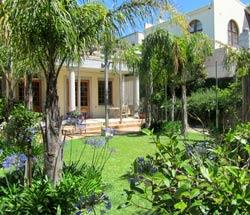The Tenant Profile Network (TPN) data for the third quarter of 2012 indicated that tenants were making their rental payments responsibly.

Greeff Rentals has a four bedroom Constantia villa with wooden parquet floors for rent, which is priced at R32 000 per month.
According to Michelle Dickens, managing director of TPN, in the buy-to-let market currently, demand outstrips supply and landlords owning properties in these price ranges can pick and choose the right tenant.
However, she warns that although there may be lots of tenants waiting to snap up a property, landlords and property owners and estate agents should not ignore the basic rules of checking the previous tenant behaviour and credit check information.
“Property investments require active involvement from the investor – managing the rental agent, managing agent and tenant,” she says.
Dickens says buy-to-let investors want returns on their investments and non-paying tenants will put pressure on the owner to meet the monthly property expenses without earning an income.
Tenants and rentals
For example, the TPN Q2 2012 report revealed that tenants renting homes priced below R3 000 per month had a high rate of non-payment with nearly one in five tenants not able to pay their rent.
Read the article here.
According to Harry van der Linde, principal and owner of the Leapfrog Pretoria East rental franchise, demand is on the rise for rental properties priced between R4 000 and R10 000 and the area is also experiencing rental stock shortages.
Van der Linde notes that many landlords are increasingly making use of rental agencies to manage their properties as a result, rentals are collected monthly when due with very few cases where tenants fail to meet their rental obligations.
Overall, there is rental demand at all price brackets with non-South African residents seeking out homes in Pretoria East with many looking at homes priced from R20 000 a month and above.
However, there are a number of tenants who seemingly battle to pay rent especially for homes priced at R15 000 and below, according to Michelle Eysele, rental agent for the Leapfrog Pretoria East franchisee.
In the Centurion area, Leapfrog reports that rental stock is low due and rental prices are definitley increasing especially in the lower price range with many looking for homes priced between R4 500 and R10 000 a month, says rental agent Mariette Schoeman.
Meanwhile in Bloemfontein, Mike Spencer of Platinum Global reports a shortage of rental stock with family homes hard to secure despite the fact that rentals have increased in this category.
Rentals have increased at above inflation rate levels in Bloemfontein typically around 10 percent thanks to lack of new development of affordable family units.

Body corporates will continue to struggle with non-paying owners dragging down entire complexes and putting pressure on the financials of the complex, and this will result in special levies being introduced.
“The bad debt ratios in Bloemfontein are still quite low with some of this caused by careful selection of tenants but mainly to the very broad base of employment in the city which is not so susceptible to economic times, either up or down,” he says.
But tenants who know their right are deliberately not paying rent.
He says they recently had a senior government official who had not paid rent for two months, locking the tenant’s door on the instruction of the landlord resulted in the tenant taking the agency to court on an emergency application.
Before the hearing the landlord allowed the agency to unlock this unit, although the tenant has since moved out of the property, the landlord now has to go the court route which is expensive – and often results in ridiculously small monthly emolument orders.
“There is a need to review the way in which non-payment of rental can be handled to prevent unpaid rentals especially from well-off individuals,” he points out.
Interestingly, he says students used to give notice on their flats over the varsity period and this led to the normal annual jump in vacancies in small flats from November to February.
However, the increases in varsity numbers has meant an early return to activity in this sector with available flats being taken up very quickly and chances are that there will be a shortage in this market before universities open, he notes.
Spencer says the problem has been caused to an extent by the lack of real willingness by local authorities to see new development take place to the western and north western side of the city, though there is now evidence of some development in the eastern part of town on the N8 towards the airport including a development of property for sale by Old Mutual.
In the Western Cape, Greeff Properties report an increase in demand for rental properties in the southern suburbs of Cape Town.

This unfurnished, three bedroom Constantia home includes full guest quarters with bedroom, lounge and kitchenette plus a flatlet or staff quarters. It is priced at R45 000 per month through Greeff Rentals. Click here to view.
According to Glenda Taylor, high demand is for secure estates and family homes located near schools while flats and homes located close to universities are in demand from October until March as parents seek accommodation for their children to occupy during their tertiary education.
Taylor explains that young professionals prefer sectional title units as they look for safe and secure apartments or homes to live in while a significant new trend is that of returning expats.
“We have found a substantial increase in enquiries from returning ex-patriots leaving the financially distressed Eurozone in search of greener pastures back home,” says Taylor.
These expats are reportedly seeking luxury homes and some people from Johannesburg rent first while looking to buy in Cape Town.
Taylor says that the current stable interest rate bodes well not only for the buy-to-let market, but also for the existing landlords who are feeling more comfortable with market related rentals.
“The gap between bond repayments and rent achievable has narrowed, allowing many landlords the opportunity to recalibrate their expectations, but one must always bear in mind that a rental is not there to pay 100 percent of your bond, but rather in place to subsidise the bond.”
She warns that overpriced properties are likely to sit longer in the market while those priced accordingly will be snapped as soon as they come onto the market.
Trends for buy-to-let
With many property experts expecting interest rates to remain low, three trends will characterise the rental market in 2013, according to Dickens.
She says body corporates will continue to struggle with non-paying owners dragging down entire complexes and putting pressure on the financials of the complex and this will result in special levies being introduced.
Furthermore, she says the financial stability of a complex affects all owners, buy-to-let owners included.
“These buy-to-let owners are not living at the complex and are usually unaware of the severity of financial situation,” she says.
She says that increased electricity costs will continue to put a burden on tenants, many who are already struggling to meet their rental commitments.
Dickens adds that rental escalations have been flat for a number of years and they are starting to see landlords demand better annual rental escalations. – Denise Mhlanga









